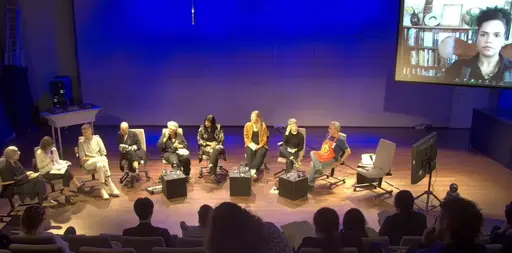
4 July 2022
Symposium: No Linear Fucking Time (videos)
If you missed the closing symposium of the exhibition No Linear Fucking Time or want to rewatch your favorite panels – now you can! The first two videos have already been uploaded on YouTube.
No Linear Fucking Time 3 December 2021–22 May 2022) was an exhibition with gatherings, an online publication, and a closing symposium. The project proposed to unsettle dominant temporalities and model alternate forms of livable time. Convened by BAK’s curator of public practice Rachael Rakes with artist-interlocutors Femke Herregraven, Jumana Manna, and Claudia Martínez Garay, as well as writer Amelia Groom, No Linear Fucking Time called upon a wide range of practitioners to examine and embody alternate scales, rhythms, and conceptions of temporal experience in order to explore how looking and working beyond linear, progressive, and globally-synchronized time can contribute to a more plurally-determined and sustainable lives. The project posits that just as time has been a homogenizing imperial force, the rethinking of time can be a key function of anti-colonial presents.
1. Toward the Not-Yet: Art as Public Practice
This presentation includes the lecture Notes on Black Subversive Time Travel and Visionary Fictions by Walidah Imarisha (online), followed by a reading and discussion with Towards the Not-Yet: Art as Public Practice (2021) editors Jeanne van Heeswijk, Maria Hlavajova, and Rachael Rakes, and contributors Clara Balaguer, Merve Bedir, Gabriel Fontana, Nicoline van Harskamp, and Jun Saturay (for the basic activist kitchen).
2. Disjunctive Temporalities of Migration and Refuge
This is a roundtable discussion with Isshaq Al-Barbary (online), Merve Bedir, Olga Bruyukhovesta (online), and Anfisa Doroshenko, moderated by Natasha Matteson with Rachael Rakes. Forced displacement has been an endemic part of ongoing imperial violence through multiple generations—and flares up, especially, when that violence surges. The act of leaving or migrating is attended by multiple specific temporalities: the right to leave, when there is a right to leave, is disintegrated by being forced to wait.
The contributors to this discussion bring their own experience of and on displacement, doing so with the heavy weight of time in mind and with consideration for those who are left behind.
The contributors to this discussion bring their own experience of and on displacement, doing so with the heavy weight of time in mind and with consideration for those who are left behind.